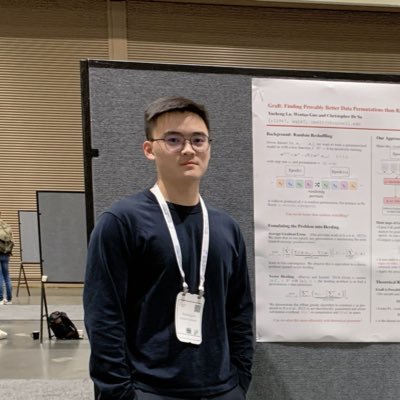
This event has concluded!
We have collected all the questions and answers here:
View on twitter
Unfortunately, probably the recommendation letters. I wish it weren't like this, but in practice, a lot of faculty rely on good recommendations to evaluate applicants. With that said, it varies by professor
View on twitter
View on twitter
IME this is super individual, but I can give mine. I look for someone aligned with my interests who would be a good teammate for my current lab, and would add something new (I don't want my lab to be super homogenous).
View on twitter
I also like recruiting students who are comfortable asking for help. Otherwise it's really hard for me to tell if I'm doing enough to help them
View on twitter
Like Talia said, it is going to vary a lot among profs. For my lab, i like to recruit students who have experience building software, communicate well, and have the drive/ambition to succeed.
View on twitter
Another thing I have heard from a lot of faculty is looking for creative people, i.e., thinking of and coming with ideas to solve problems, or come up with new problem statements ... Not all ideas have to work, but the student should atleast show desire to try new approaches
View on twitter
View on twitter
Ask their students!!! Current and former
View on twitter
Use @CSrankings! If your undergrad profs follow research, ask them for recommendations. Follow the profs on social media/blogs to get a sense for their style. Otherwise it's hard to tell without talking to them or their students.
View on twitter
To know the lab culture, I highly recommend setting up calls with current grad students in the lab. I was surprised how helpful, open and honest they were in describing their lab culture.
View on twitter
View on twitter
I personally think it's valuable, specially if your interests and background are relevant to those potential advisors'. This guide by @sarahnadi has great insights on how to contact potential supervisors
View on twitter
A thoughtful email can't hurt and can help. The best emails, IME, don't use generic templates, and make a genuine case for alignment with my interests. It can be hard to understand how to do that from looking at a website, so feel free to talk through with a mentor first
View on twitter
No. I wouldn't bother doing this unless the prof recommends doing so on their web page.
View on twitter
Sometimes sending an email to a PhD student in the advisors group can be useful ... I often recisbe such messages, and mention any interesting sthdents to my advisor ... Keep the message short though
View on twitter
View on twitter
Oh, I love coadvising! Honestly I love when students do this because it gives me a chance to learn something new, and interesting projects form at the intersection of interests. I'd look for coadvisors that you think have complementary backgrounds/interests that align with yours.
View on twitter
In my case the student just listed both advisors as potential advisors, and then we spoke to each other about it. But you could always ask the potential advisor directly if they'd be open to coadvising
View on twitter
I wouldn't worry about this at the application stage. Co advising can always happen post acceptance.
View on twitter
View on twitter
Yes and no. In my case, it would help since I look for soft engineering experience. But i doubt it would help if you want to do theory research.
View on twitter
I think they can help, especially if you don't have more formal research experience. I've also had students without formal research experience tell me they did something on their own, like go through one of the major textbooks with exercises for my area, or implement something
View on twitter
If a student contributes to, say, a programming language or proof assistant (tools for my area), a compiler, or a verified tool of any kind, I'm going to view this extremely positively, even if it's not formally "research"
View on twitter
YMMV but I also look very positively on software engineering experience of any kind, even if it's not "research." Also, the research doesn't have to be in the same field as the one you're applying for
View on twitter
Also at least in my area I don't expect undergrads to have publications. Doing research and getting a good letter or writing an honors thesis counts just as much to me
View on twitter
Generally in Systems related research having demonstrable engineering skills is viewed positively ... In particular in embedded systems, having demontrable knowledge of firmware and hardware design in considered a positive in applications
View on twitter
View on twitter
Pick the profs you have interacted with the most, who know you as beyond a grade in their class. Give them enough information to write a good letter.
View on twitter
Give writers plenty of notice, and send your materials ahead of time. Also, one thing that can work is to try those letters out early for some kind of award application
View on twitter
My undergrad advisor @mnwsth has written a great blog on requesting and writing LoRs which has guidelines on how you can help him write a good letter- https://manu-awasthi.medium.com/requesting-and-writing-letters-of-recommendation-reference-57baaf466cd0
View on twitter
View on twitter
Many schools now have programs where current grad students critique applications (there is one at @UTCompSci). This can provide great feedback.
View on twitter
In addition to these comments, if you're close to one of your letter writers, you can ask them for feedback too
View on twitter
I find programs which pair current PhD students with applicants to be great for getting feedback. MIT EECS GAAP (https://eecs-gaap.mit.edu) is one such example.
View on twitter
Fill out this form http://tinyurl.com/cs-app-help if you'd like to receive feedback on your CS gradschool application material (SOP, CV, ...)! If you're interested in helping me w/ this voluntary&independent effort, sign up here http://tinyurl.com/grad-app-mentor so we can help more students!
View on twitter
You can also try reaching out to PhD students of faculty you are interested in working with, especially the younger PhD students (1st-2nd year) ... They may not always respond, but if they do you get good feedback
View on twitter
View on twitter
This is one of those things that varies by professor. But for me it is mostly about getting a feel for conversational chemistry, like can the student and I actually communicate with each other?
View on twitter
So I do a 30 minute chat, and mostly ask about their experience, interests, preferred advising style, collaboration style, and so on. But mostly the interview is about whether we can communicate with each other, rather than their answers
View on twitter
It varies, but in my case, everyone I choose to interview is someone I think is "good enough" for the lab, or someone who reached out convincingly. So it's more about how the person and I interact and where they'd complement my lab to build a better team
View on twitter
I do something very similar to Talia. So in general, i find i can always tell whether a student would be successful with me/in my group with a quick chat. It's a combination of communication skills, personality, and drive/ambition.
View on twitter
I only chat with folks where i think they could be a viable part of my group, and the chat helps me see if there is a match between us. So it's not like a technical interview and more of a getting to know you kind of interview.
View on twitter
I also do a short chat w/ students who are viable matches. Usually e-mail them a short, accessible paper to read before the interview, and then ask what they learned from it & talk about ideas that emerge from reading it. Also ask about their goals and expectations.
View on twitter
Not looking for "right" answers, but whether they can start to formulate ideas (even if the ideas aren't great or have already been done), and can communicate w/ me about research-related concepts. And to get a sense of what they're looking for & how the Ph.D will help them.
View on twitter
That depends, based on my experience these interviews were mainly casual research conversations (to make sure there is a good match). In very few cases I was given technical problems (no coding), I think this usually happens when the meeting is scheduled for over 30min.
View on twitter
View on twitter
All else being equal, go to the place where the students seem the happiest, and where you can see yourself having a fun life outside research. Aim to figure this out during visit days.
View on twitter
Agree with @vj_chidambaram; talk to different students in the research group and understand the work culture ... Figure out for yourself if the work culture is agreeable and you see being comfortable doing that for 5-6 years
View on twitter
View on twitter
The undergrad me was too fixated on university rankings. While things worked out fortunately, I recommend grad applicants to prioritize choosing a supportive advisor, exciting research area, open department culture, and nice location when considering similar tier schools.
View on twitter
To add onto this, "tiers" matter a lot more than "rankings". There is a big diff between the top-5 and the top-10/top-15, not much difference between rank 14 and 17.
View on twitter
For example, UT (where I work) and Wisconsin (where i did my PhD) are in the same tier (roughly). The ranks might be different but not in a significant way.
View on twitter
Adding to the points above, you may get an admit in a department of your choice but not necessarily with a faculty of your choice ... Students often accept admits, hoping they can work with the faculty in the future, but end up disappointed ... Be wary of this
View on twitter
Similar to point on university rankings ... Don't simply go for the famous, accomplished faculty (the big name) ... pay more attention to whether their work style, research ideas, goals, thought process etc. appeal to you; you'll have a much better PhD experience then
View on twitter
The most important barriers to grad school that I’ve heard are not knowing 1. Grad school is paid for and you get a small stipend! You do not have to pay for a PhD; and 2. You can get fee waivers from American schools. The way to apply varies. Ask grad students for help.
View on twitter
Graduate School Applications
Hello grad school aspirants,
We are organizing a tweetstorm to answer all your queries about the grad school application process! Ask your questions in the Slido below.
On October 28, we will post a curated list of your questions from Slido on our Twitter account. Professors and students, some of which are listed below, will answer your questions on Twitter.
- When:
- October 28, 2022
- Where:
- Our Twitter: @StudentsSystems
- Join our mailing list for updates: Mailing List

Panelists
- Vijay Chidambaram - Professor, University of Texas at Austin (@vj_chidambaram)
- Talia Ringer - Professor, University of Illinois at Urbana-Champaign (@TaliaRinger)
- Mohammad Shahrad - Professor, University of British Columbia (@MShahrad)
- Nishant Bhaskar - PhD Student, University of California San Diego (@nishant412)
- Yucheng Lu - PhD Student, Cornell University (@yuchengthekid)









